Dev Bhagavān
Becoming Genius
Episode 3–Ontology
Transcription
Dev Priyānanda Svāmī Bhagavān
Video Link: YouTube
Ontology—the King of Sciences; the Science of Being; the Science of Sciences.
If you want to create a new science, how do you do it? With ontology. So ontology, the science of being and becoming, is the highest-level knowledge in existence. That’s why it is uniquely qualified to translate the wisdom of the East into terms that are understandable in the language of the West.
Practically speaking, our Western languages have to be extended and enhanced to capture the concepts that are revealed in the Eastern wisdom. This isn’t an accident: as we spoke about earlier in the previous episodes of this series, the knowledge of being and becoming has been deliberately buried in graduate and postgraduate curriculum, so that most people never get ahold of it, never even touch it.
We want to give access to ontological knowledge, because this is how you change your being. And if you want to do anything significant in life, you have to be able to do that; you have to be able to change your being—deliberately and scientifically—into exactly what you want it to be. This is how one attains the genius level of competence in any field; and since what we’re talking about here is becoming genius, that means ultimately the only body of knowledge that’s going to be useful to us is ontology.
So, what is ontology? It’s a very esoteric secret, so we’re going to gradually introduce you to ontology. So far we’ve covered duplication and then understanding. Now we’re beginning to discuss analysis—not any old analysis, but ontological analysis—analysis of being. And how do we do that we do it? By using terms—terminology, words and symbols about the subject.
Now if you have correctly duplicated the subject—made a perfect copy of it in your own mind—and then if you have gone through and understood that subject with the methods that we gave in the previous video, you have what is known as a taxonomy of that subject. That is a structured list of terms, also known as a terministic screen, where you have all the cogent terms of the discipline that you’re studying arranged in a sequence of hierarchical relationships that actively can be used to predict the cause and effect of that particular field.
Now the next step is the ontological analysis of those relationships; and the aim of this is to create a context—an ontological context for your ontic experience of that field—and this is what gives you the being of a genius in that field.
I know you don’t know what I’m talking about—this is a new subject for almost everyone. But hopefully the succeeding material will give you the overview of the subject of ontology and ontics that you need to understand. This is the crux of our method of becoming genius.
So now let’s take a good look at the science of ontology, and then in the next video we’ll go through an actual example of how to do an ontological analysis.
First you need to know what ontology is, and how it fits into the big picture of our Skillful Living Becoming Genius program. So first of all, there are four stages of becoming genius.
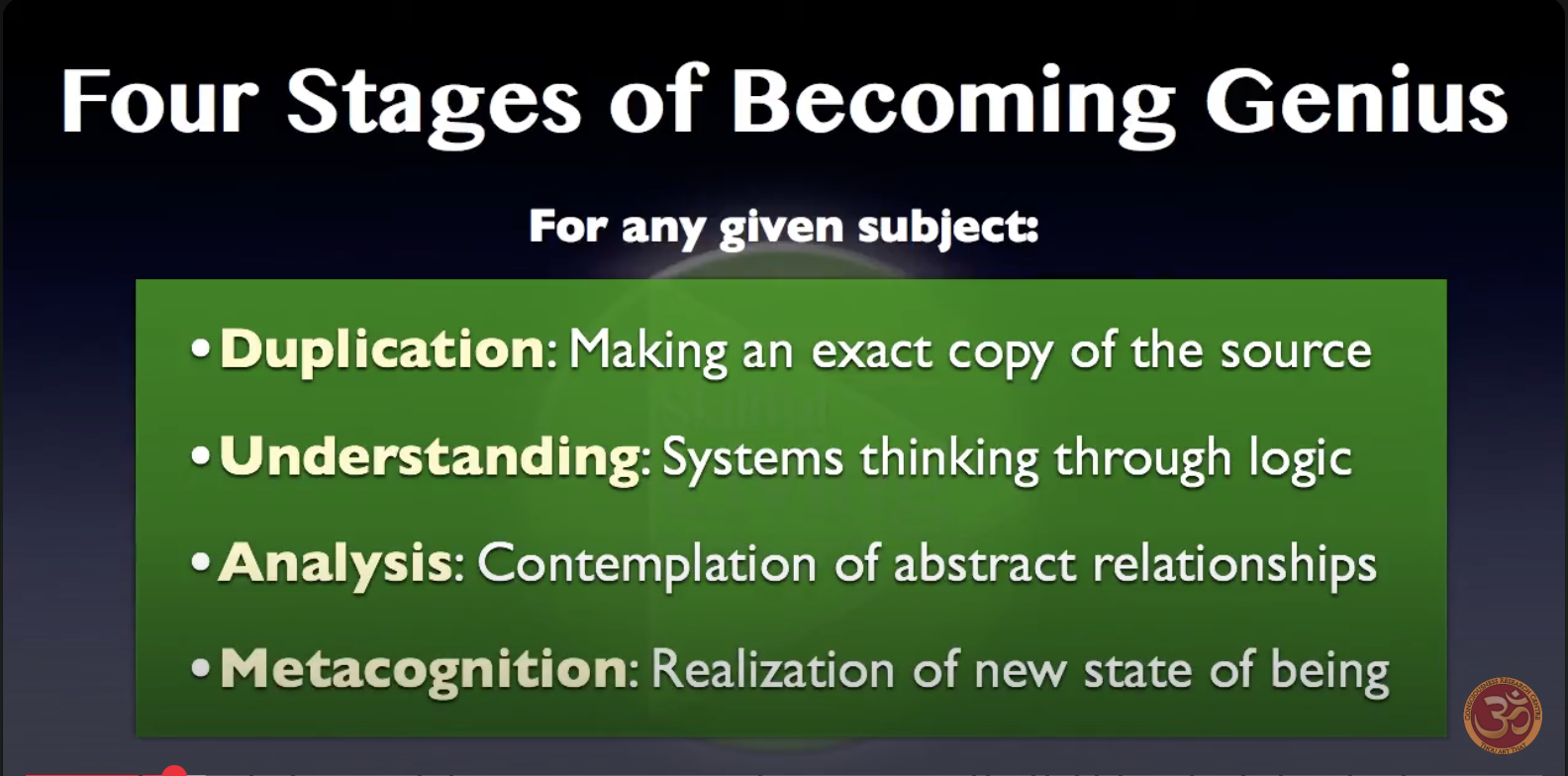
For any subject, duplication is the first stage. That means making an exact copy of the source by looking up and being familiar with all the definitions of the important terms.
The next stage is understanding, which we define as systems thinking through logic. And what it means in practice is that you generate handwritten summaries, outlines, narrations, and finally a mind-map of the subject from your own knowledge—without checking with the source, because you already have a perfect copy of the source, right? And then you check that against the source and make sure you really understood it properly.
Next stage is analysis—ontological analysis—analysis in terms of being. And how do we do that? We contemplate the abstract relationships among the entities in our model, and we also plot them on a particular type of graph, which we’ll introduce you to in this video, and explain in great detail in the next video.
And finally we reach a stage called metacognition, where you realize a new state of being based on your study of the materials.
Now again I’m going to go over the conventional conception versus the ontological/ontic conception.
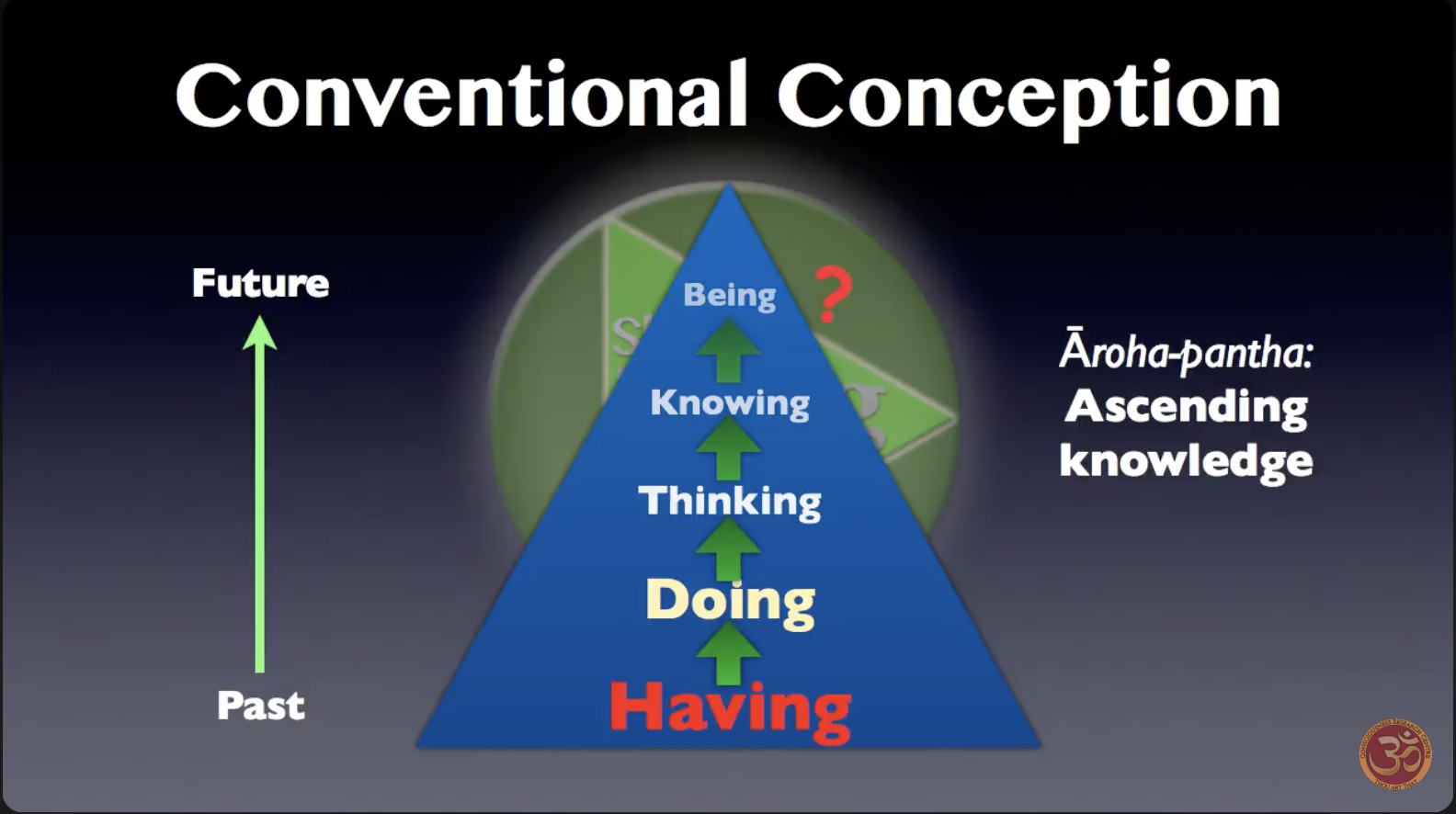
In the conventional conception, the most important thing is seen as having. You have to have something and then you can do something with it; by doing something then you get to think about the thing, and eventually you know it. Finally, maybe up somewhere far away is being; but we’re not really sure about that, because we don’t have an adequate terminology or instruction in being.
Now this is called in Vedic and Sanskrit terminology āroha pantha, the path of ascension. Ascending knowledge means building like a pyramid, one level at a time, from what has gone on in the past. This is a very important definition. So by having that we can do something, then we can think about it, then maybe we can know something. And finally, maybe a long ways away, we can change our being. But this is very inefficient, time- and energy-consuming, and error-prone, because there’s no way to check back and see that the being that you are becoming is really what you want to be.
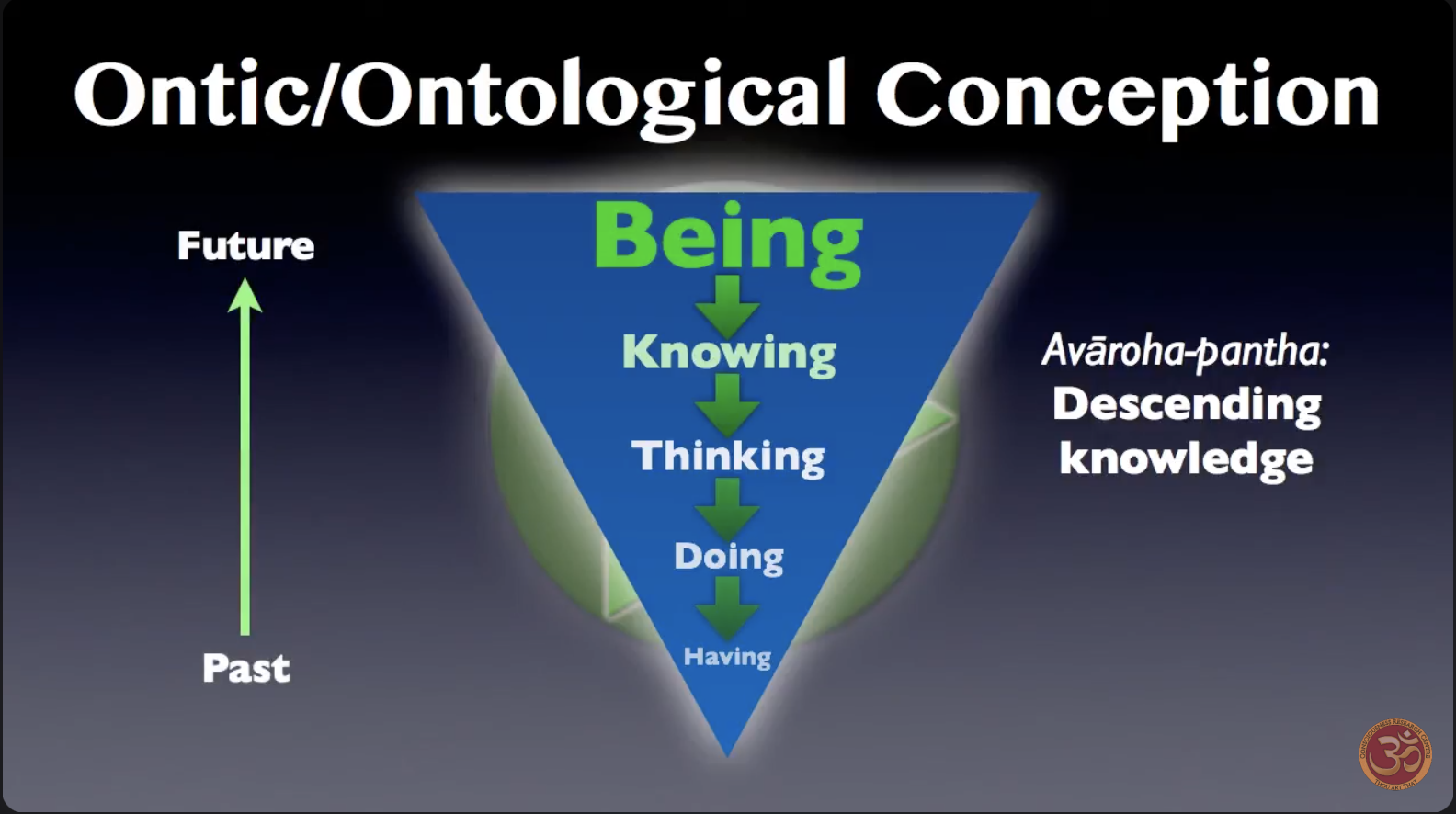
Now let’s take a look at the ontic/ontological conception; and of course this is absolutely the reverse. We start from being. Once we determine the type of being that we want to have, then we can understand the knowing that we need, the thinking that we have to have, and the doing to manifest that state of being. And finally way down the road we come to the havingness of that being, automatically.
Now the advantage of this is that, once you start out from being, knowing, thinking and the rest are all natural consequences from that point. You are creating a cause, and that cause has a natural effect according to the law of nature. And once that cause is put in motion there’s really nothing that can stop it.
So in eastern terminology this is called a avāroha pantha: the descending path, descending knowledge. And of course the advantage is we already know what being we’re trying to attain, so we have a way to check every subsequent stage to see if it’s in line with the being that we want, and correct it. The ontic and ontological conception is much more efficient. The descending path is actually much easier than the ascending path; the only thing that’s missing is knowledge of being so that we can put it to use. So let’s get some of that knowledge.
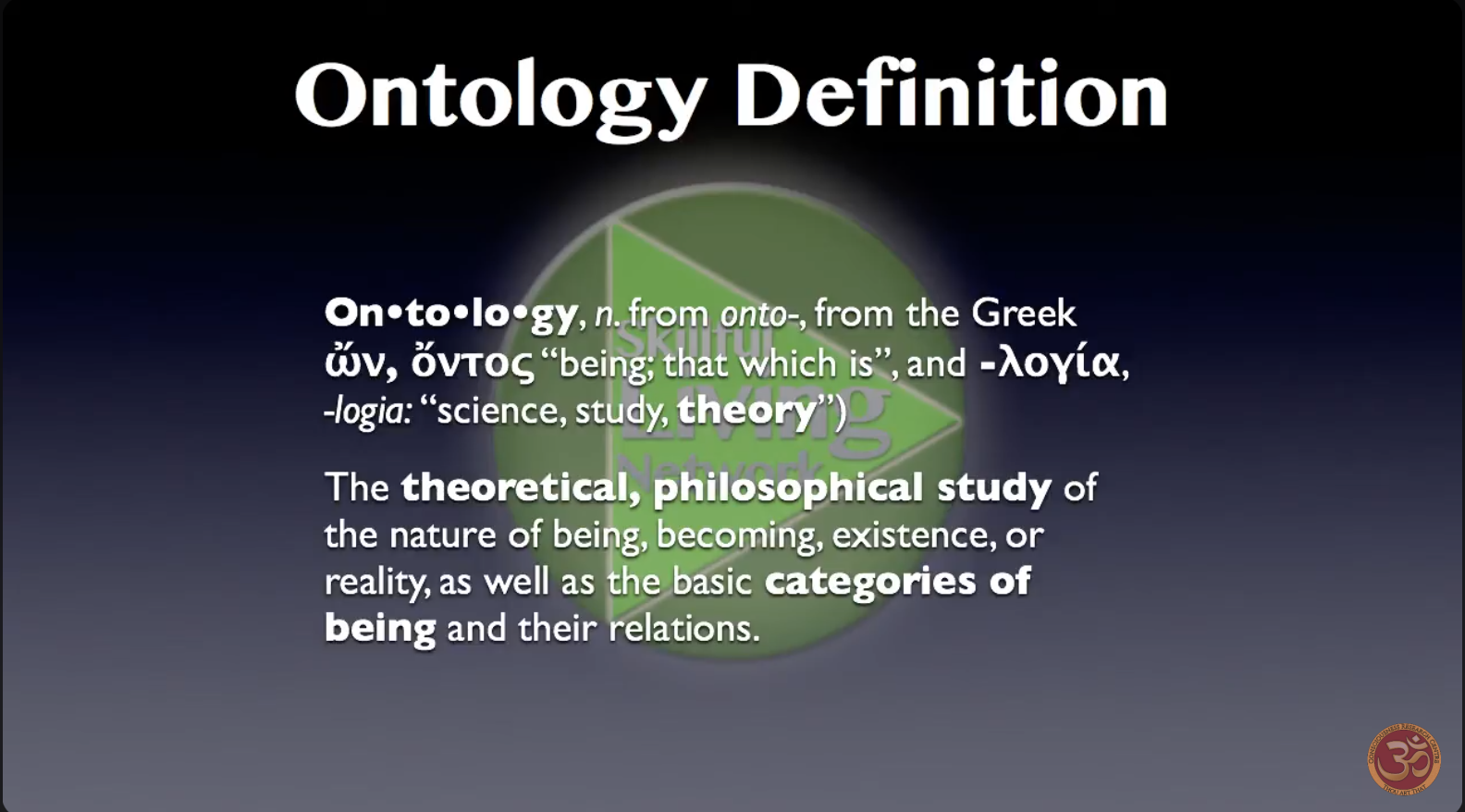
Here’s the definition of ontology. Ontology is a noun from onto-, the root onto- from the Greek ών, ōn, ώντος, ōntos, ’being’ or ’that which is’, and -λογία, -logia: science, study or theory. So ontology is the theoretical philosophical study of the nature of being, becoming, existence or reality, as well as the basic categories of being and their relations.
So in other words, your ontology is like a map of what can be. And you really cannot attain any state of being outside of your ontology: the categories that you have established for the possibilities of existence, possibilities of reality. That means the limitations of your ontology are also the limitations of your being.
This is a very important point. If we are to grow our being, if we are to become more than we are right now, more than we wound up being, or just became more or less by accident—if we wish to become something with intention, we’re going to have to grow, we’re going to have to change our being, expand our being. That means we’re going to have to expand our ontology: expand our knowledge of possible states of being, and maybe also change our value system with respect to which one of them is most valuable.
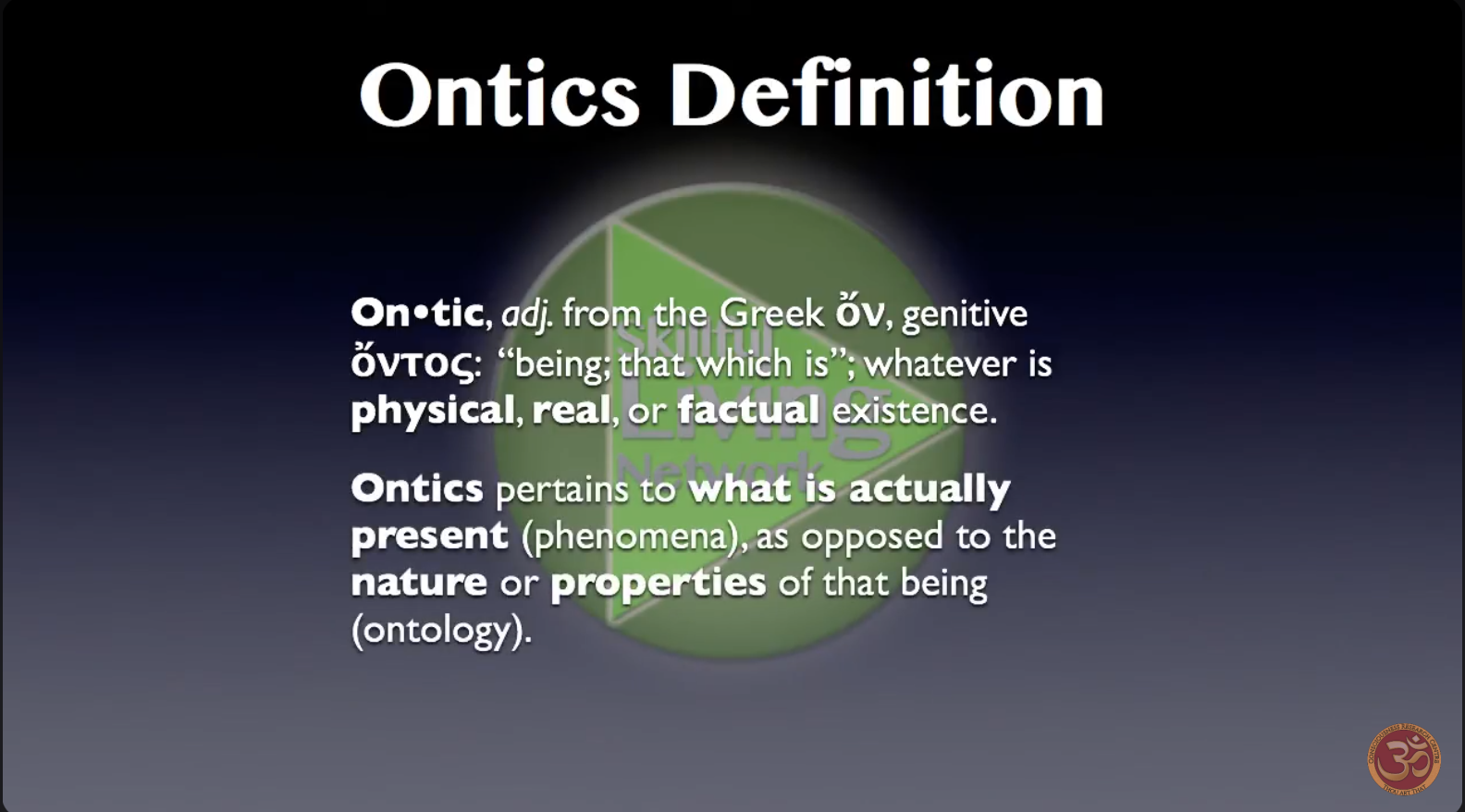
Now let’s take a look at the definition of ontics. Ontic is an adjective, ontics is the related noun; again from the Greek ών, the genitive case which is ώντος, being: that which is. But in ontics we are concerned with whatever is physical, real or factual existence on any level. In other words, ontics pertains to what is actually present—phenomena as opposed to the nature or properties of that being, ontology. Ontology is more of an analytical science; ontics is an experiential science. And we are going to go into that distinction, into the distinction between ontology and ontics, very deeply in the rest of this video.
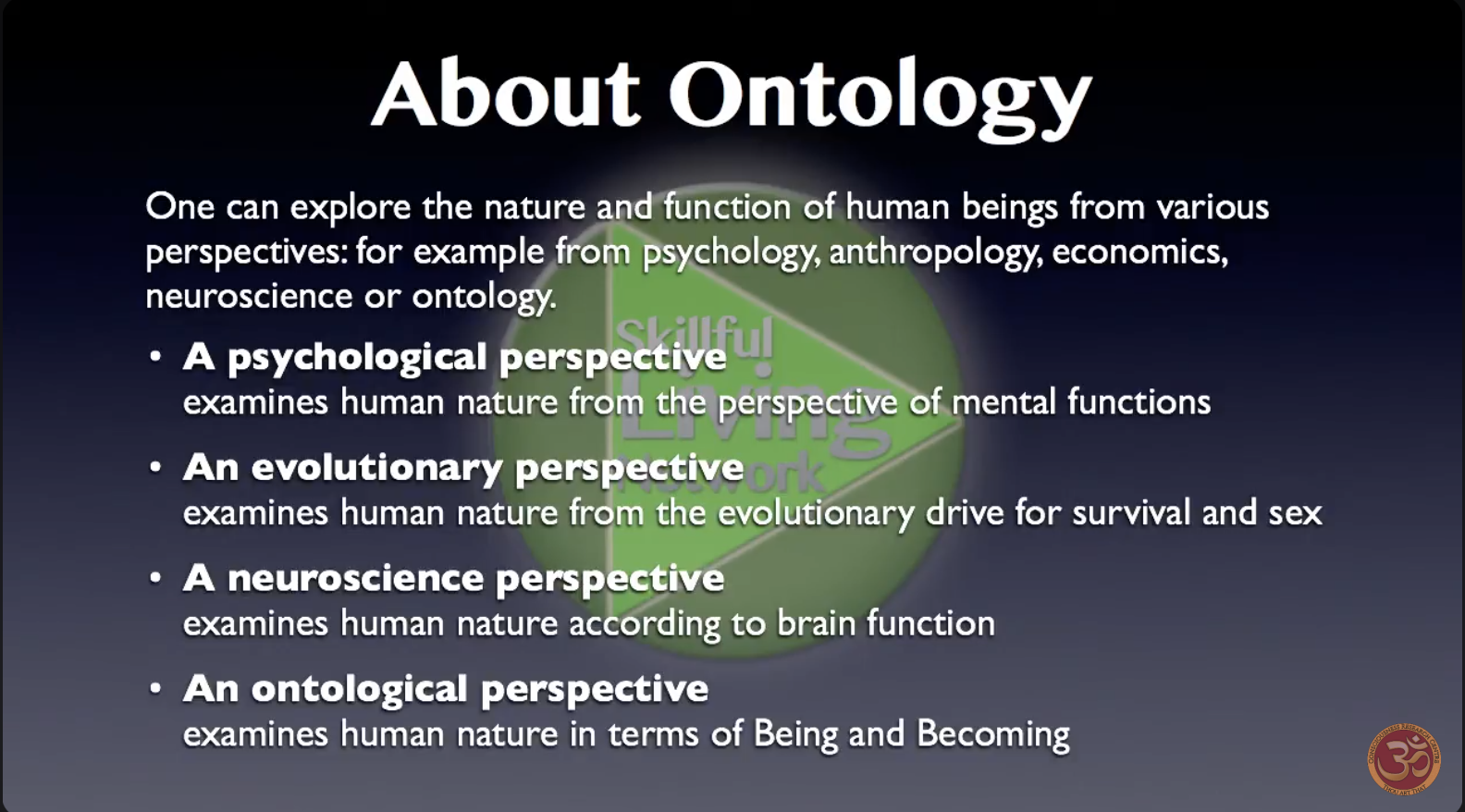
Now let’s talk some more about ontology. Ontology in general is the science of being; but here we are concerned with the ontology of human beings (the nature and function of beingness for human beings). Specifically we are concerned with the ontology of genius (the nature and function of being for genius and the actions of genius-level intelligence). Who you are being when being a genius shapes your perceptions, emotions, creative imagination, thinking, planning, and consequently your actions in the exercise of that genius.
In other words it’s a top-down thing; it’s the ontological view of being. Whoever you are being is going to shape your thoughts, feelings, actions and so on. It’s going to influence your knowledge, because anything that comes up that’s outside your range of being, you won’t be able to recognize it. It could be there right in front of you; you won’t even see it.
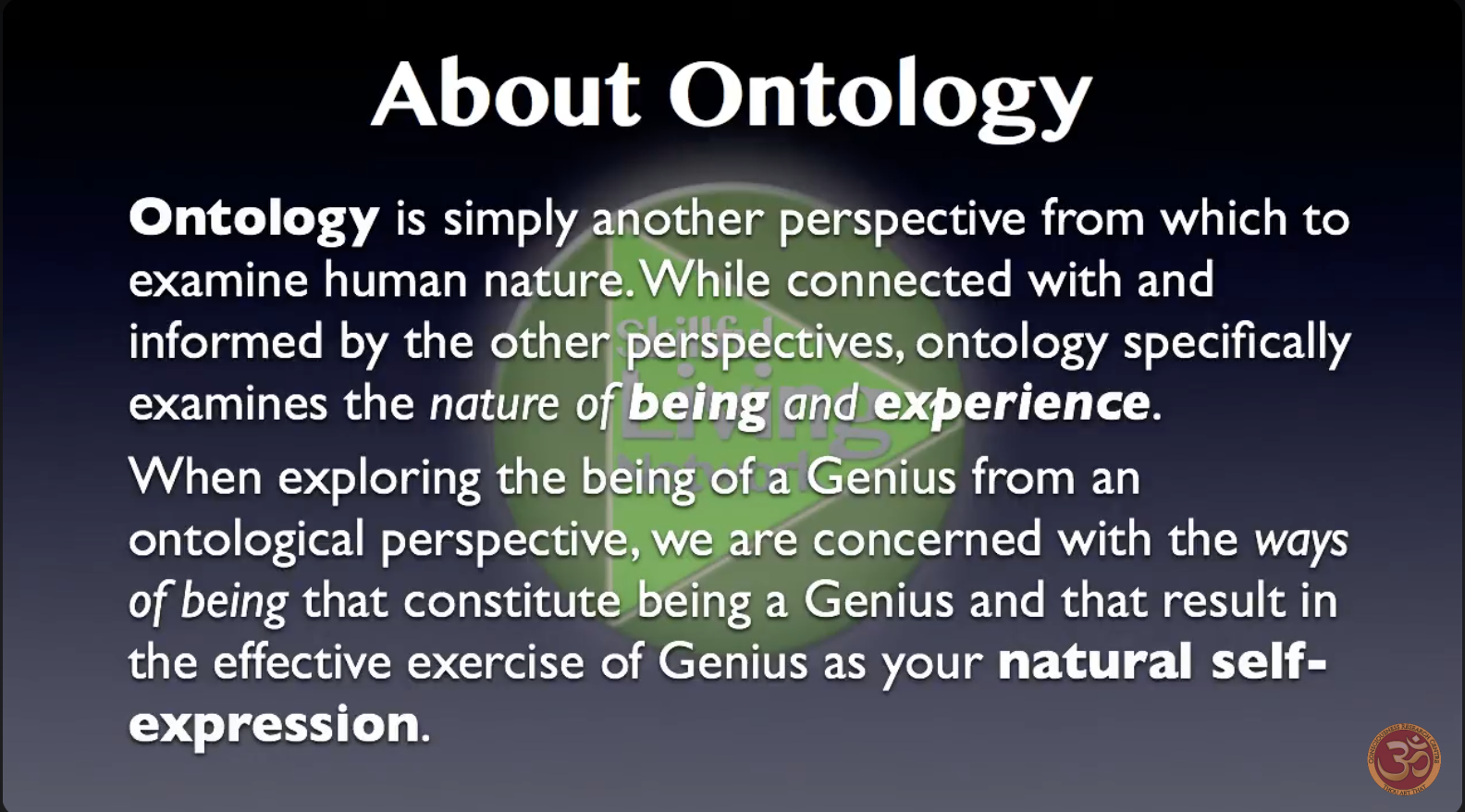
Ontology is one way of looking at human beingness. One can explore the nature and function of human beings from various perspectives: for example from psychology, anthropology, economics, neuroscience or ontology. A psychological perspective examines human nature from the perspective of mental functions; an evolutionary perspective examines human nature from the evolutionary drive for survival and sex; a neuroscience perspective examines human nature according to brain function, and an ontological perspective examines human nature in terms of being and becoming.
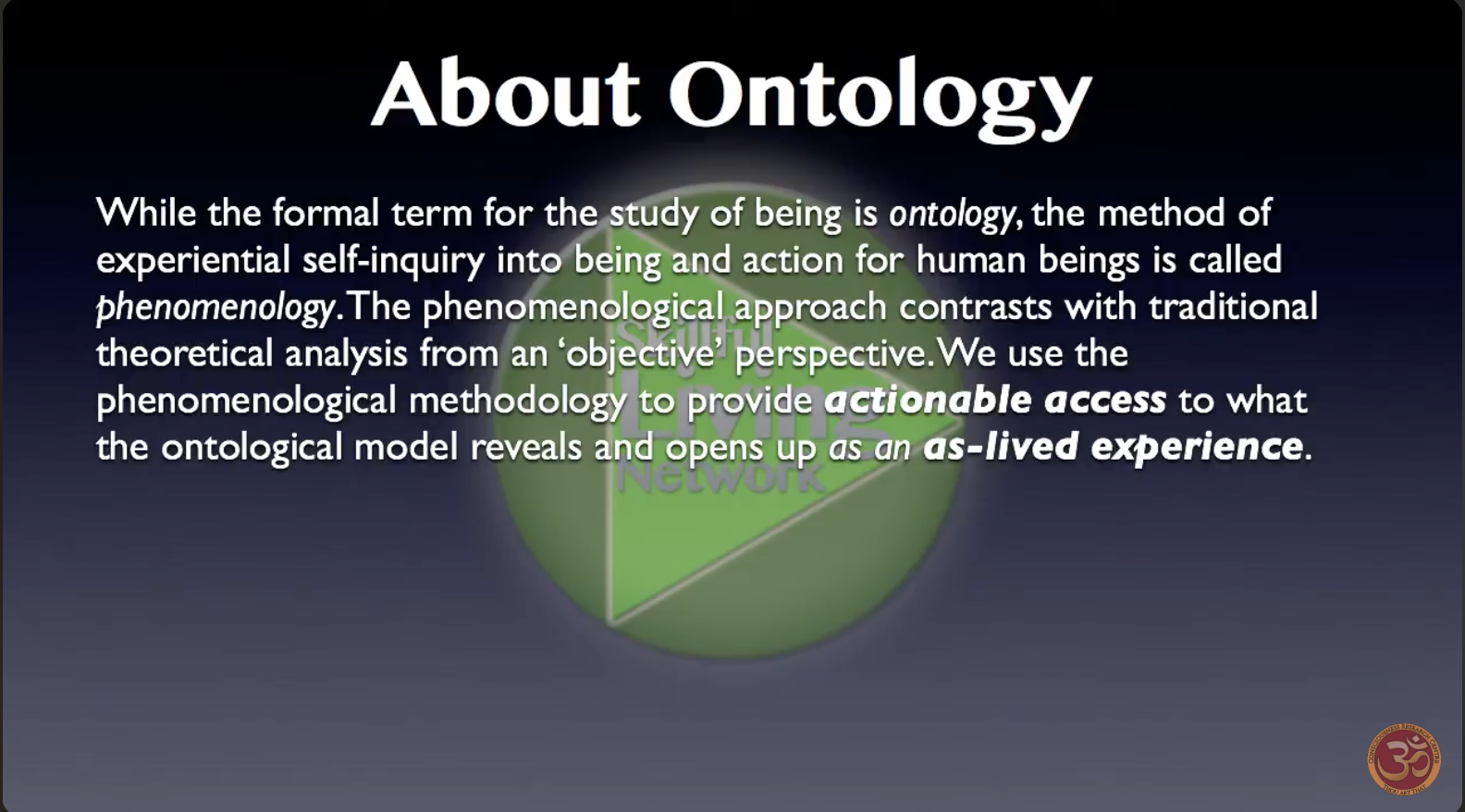
So ontology is simply another perspective from which to examine human nature. While connected with and informed by the other perspectives, ontology specifically examines the nature of being and experience in the ontics part of ontology. When exploring the being of a genius from an ontological perspective we are concerned with the ways of being that constitute being a genius and that result in the effective exercise of genius as your natural self-expression.
In other words, it’s no good trying to imitate a genius. Like if we got all kinds of material about Einstein, and we studied everything about him—his lifestyle, his actions, what he did every day, how he tied his shoes or combed his hair—in other words he didn’t—maybe you would cultivate the wild Einstein hairdo and the tweed suits. Is that going to make you a genius? No, sorry, it’s going to make you an imitation genius, and everybody hates a poser. Everybody hates somebody who’s just faking it, a wannabe, trying to be something that he’s really not.
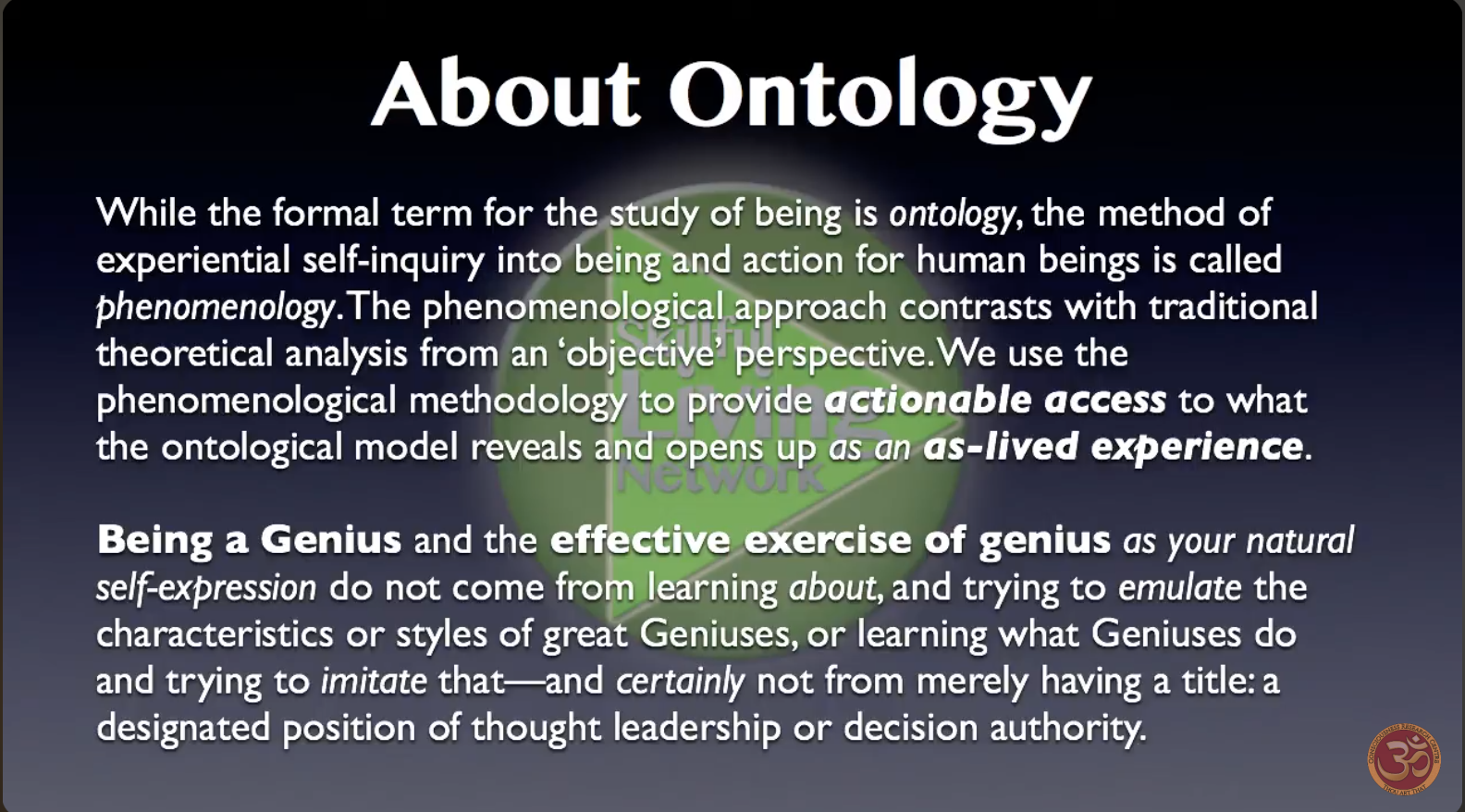
So how do we actually become a genius? Let’s look into it some more. While the formal term for the study of being is ontology, the method of experiential self-inquiry into being and action for human beings is called phenomenology. The phenomenological approach contrasts with traditional theoretical analysis from an ’objective’ perspective—whatever that is. We use the phenomenological methodology to provide actionable access to what the ontological model reveals and opens up, as an as-lived experience.
This is ontics, folks. Ontology will teach us about the kind of being that we want, but ontics is actually going out and experiencing that being for ourselves. So they go hand-in-hand; they really can’t be separated. Heidegger was famous for saying “Ontology is possible only as phenomenology,” in other words, as ontics. So you can have ontology as a nice theoretical science of being, but without ontics you won’t find the access, the key to actually manifesting it as a phenomenon, as a state of being.
Furthermore, being a genius and the effective exercise of genius as your natural self-expression do not come from learning about and trying to emulate the characteristics or styles of great geniuses, or learning what geniuses do and trying to imitate that—and certainly not from merely having a title, a designated position of thought leadership or decision authority.
Havingness is the lowest thing on the scale of being. So if we, say we take some idiot and we say, “Okay you are now the Professor Emeritus Chair of the Physics Department,” is he gonna be really a genius? No, it’s like dressing a dog up as a king. You can come and offer all the things that are offered to a king to this stupid dog, but as soon as you throw a bone, he’s going to jump down off the throne and go chase it. So you can’t take the dog out of the dog without changing his being. He has to become something more to be a real king. We have to become something more than what we already are to become a real genius, and there’s no way to imitate that.
What’s needed is called ontological education, as opposed to epistemological education, which is just knowing about something. Epistemological mastery of a subject leaves you knowing about it; ontological mastery of a subject leaves you being it. Gaining experiential access to being a genius and the effective exercise of genius as your natural self expression also requires dealing with factors present in all human beings that constrain our freedom to be and do by constraining and shaping our perceptions, emotions, creative imagination, thinking and planning. When one is free from these ontological constraints—your way of being and acting results naturally in your personal best in any situation. Our purpose in this series is to help you accomplish this for yourself.
In other words the top-down approach. Just like the bottom-up approach is based on the past—what I did in the past becomes the foundation for the next thing, and then that becomes the foundation for something else, and further on up into the present, where we’re actually acting and doing and being whatever is the result of our previous activities—instead we’re going to adopt a future-oriented approach, the ontological approach: “This is what I want to be in the future, and now how do I make my knowledge, thinking, doing and having align with that, to really become that?” And the way you learn this is by ontological education. We’re going to be talking and doing quite a bit of this, so get used to the idea.
The intention of this series is to leave you being a genius and exercising genius effectively as your natural self-expression. The experiential approach gives you the opportunity to experience the being and action of a genius. In other words, we want you to take everything you learn in this series and actually put it to use. There isn’t going to be a test. There’s no quiz, no salesman will call; we’re not looking for donations or membership. Maybe some good feedback, yeah but you’re not going to become a part of some organization or anything unless you want to.
But really what we want you to do is to take this knowledge and put it to use practically in your life. That’s real experiential learning. Not like you’ve been taught in school, completely opposite what you’ve been taught in school. You’re going to have to unlearn so many things that hold you back. And mainly these are bad habits of learning from your previous schooling and so-called education, that was just teaching you how to get through school, not how to actually do anything practical in life.
Therefore the aim of experiential ontological education is to equip you to actually do the things that we’re learning about; and that’s a whole different approach, it’s a future-oriented approach, a top-down approach beginning from being.
Ordinary informational education would have you learn the characteristics, styles and skills of famous geniuses, then try to remember and apply them when appropriate. That’s not being, that’s imitating. Imitative action can never be authentic enough to engender the confidence and expertise required for real genius.
Einstein came up with his theory of Relativity without ever setting foot in a physics lab—that’s genius. He didn’t require any fancy measuring equipment or particle accelerators or any of that stuff. He thought it through with his intelligence. Why? How could he do that? Because he was already being a genius, so naturally the knowledge and the thinking that come from being genius manifested in him.
You see how proactive this approach is? Not like you learn just to go to school to become a genius. That’s ridiculous! It’s like going to school to learn to think for yourself. You’ll never learn to think for yourself in school; they discourage it—actively—they’ll punish you for it. But if you go out on your own, in the middle of the woods, and then you start trying to learn how to think, then you can learn to think for yourself. This is one of those things that you can only learn by doing it. That’s the whole idea of this series.
Therefore, this series is not designed to leave you merely knowing about genius and geniuses, and able to intelligently discuss the issues around them. Rather this series is designed to give you actual access to being a genius and exercising your genius effectively in your life as your natural self-expression.
You can’t fake being a genius. You can’t just write down a bunch of equations and everybody’s gonna go, “Oooh wow, that’s great!” No, because why? There are people out there who actually know this stuff; there are people out there who are already actually geniuses, who are already actually enlightened, who are already actually expert in the field, and they’ll call you out.
Learning by Being means there’s nothing to remember; no rules, charts or references to look up; no set procedure or process to go through when an opportunity for genius arises. You simply respond immediately, intuitively, spontaneously and confidently to the challenges of learning with your entire energy and being.
So we’re not going to give you a bunch of material that you have to memorize and then give back on a test, or something like that. There is no test. Life is going to test you: are you really a genius?
What does it mean to be a genius? It means to bring a new reality into manifestation; something that has never existed before, something new and valuable. Anybody can make up something new, but something new that’s also true, a deep insight into the nature of reality that never existed before—this is the role of a genius. If you want to be a genius in whatever field you’re attracted to study—and we hope that you want to study Skillful Living as taught by the Buddha—even if you want to study something else, that’s all right.
The point is, learn how to become a real genius—not a phony genius, not a guy who gets up there and just talks very loud about something he doesn’t really know anything about. Someone who may speak quietly, but with real insight and reveal something, open up something, give access to something that has never been available before—that’s what genius is. It’s making an original contribution to a field that enhances and enriches everyone connected with it. That’s why being a genius is the most valuable thing in life.
Therefore you will not get to be an authentic genius and exercise your genius as your natural self expression by going to school. You need to take apprenticeship from someone who has mastered the personal qualities and skills required for being a genius and exercising genius as his natural self-expression.
You can’t learn Being from a book; you can’t learn Being from an ontological analysis done with a piece of software. It’s very helpful, and it’s a step on the way. Everything we’ve been talking about so far—duplication, understanding, outlining, essaying, cause and effect, handwriting, making charts and graphs, doing a mind-map etc. This is all preliminary; this is simply the homework.
The actual lesson is when you meet somebody—a real live breathing person—who is in the state of being that you want to attain. And then what do you do? You apprentice yourself to them, you serve them, you say, “How can I help you? I want to learn what you’ve got. I want to be what you are. Teach me how to do this.” And of course the only real answer to that is, “Well, hang out with me, and absorb it by osmosis.”
The teachers you’ve had so far have all been phonies—losers, fourth-class academics. That’s why they’re teachers. That’s why they’re not out there in the real world doing something original and exciting. So every time you think of teaching or learning, you think of this loser, this fourth-class individual who actually can’t teach you anything; who isn’t somebody that you would want to hang out with after school on your own time.
I understand how this is. I felt the same way—until I met someone who was actually enlightened and I said, “Ah! I want to be like that!” So what did I do? I apprenticed myself to him, and I served him for almost 40 years. Then I became my own independent teacher, my own independent genius, my own Self-realized self. I also gave apprenticeship to others. That’s how it works. That’s the only way it can work, because we’re talking about Being here; we’re not talking about knowledge or information or doing or having—Being, is something only a living entity can have, by definition.
There is a type of being that inanimate objects have, but that being never changes, except maybe to disintegrate over time. The being of a conscious living entity is the thing we’re interested in. Human beingness: the nature and function for human beings as they become and manifest genius. That’s what we’re looking for here. In other words, you eventually—if you’re serious about this, if you really want this—you’re going to have to find someone who is in that state of being, and become their apprentice.
This requires a willingness to work hard on yourself to acquire the relevant skills and qualities by experience and to voluntarily serve your master to free up his time and energy to teach you. This was the method used by monks and wise men of old to master becoming a genius. The best servants become the best masters.
Look at history, look at every wise man—even the Buddha, he also went to teachers. He outgrew his teachers, and he went on to become something more than all of his teachers. But he still approached teachers, and at the end someone asked the Buddha, “Well now you’re the greatest Self-realized philosopher ever. Who do you worship? Everyone’s worshipping you, but who you worship?” He said, “I worship the Dhamma; I worship the truth; I worship the way it is,” because he found out the way it is for human beings, and he taught that: the Four Noble Truths.
We will be going into that a ways down the line. First I want to help you overcome your learning disabilities caused by wrong teaching in school. That’s what this series is all about. And then after this series, we’ll get into another series where we apply all this.
The experiential methodology of becoming genius is based on phenomenology. This means your learning experience is driven, not by theory, but by your direct personal experience and participation. It’s up to you to put this into practice; it’s up to you to bring these ideas into manifestation in your own life or find them in your own experience.
I’ll give you an example. Let’s say you went through school, and you try to hold your experience in school in the context of being about learning and knowledge. And there’s something wrong; it just doesn’t fit; it doesn’t feel right; there are too many weird, strange, obviously out-of-place things in school for it to really be about learning and knowledge. For example, they don’t teach you how to learn did they? Then, if you go back and you recontextualize your experience in school, now you put your whole experience into it, everything you’ve learned from life so far, and you realize: “Wait a minute, this school experience was really about becoming a follower, becoming a slave, taking instruction, following authority: social conditioning.” Ah!
If you read or or view the videos of John Taylor Gatto—which you really should do—he’s going to teach you all this. And he’s probably the most experienced teacher, or the most intelligent teacher I’ve ever run into, anyway, as far as the schoolteacher goes. And he researched how the system was built—and he said it’s not about learning, it’s about becoming obedient.
So the being you have as a result of 12 years or more of school conditioning is the being of a follower, the being of a slave, the being of a fool. You’ve been exploited, you’ve been misused. We’re trying to erase all that, because it’s going to hold you back. So you have to find it in yourself, you have to look back over your experience and reclassify everything, re-parse your early life experience, especially, and realize how so many of the things that people told you and did to you were for the purpose of guiding you into a channel of obedience, not about learning anything that’s really good for you, or is going to help you attain your purposes in life.
There is no free lunch. The benefit you will get is proportional to your effort to apply the material. On the other hand, the potential benefit you can realize is determined and limited only by your effort and participation—the time and energy, commitment and the value of your background—that you bring to the experience. You can choose now whether to just window shop or to maximize the value you get from this series by full participation.
What you get out of this series is up to you. You can just sit back, watch the videos—maybe just watch the first half of each one—you’re not gonna get it, I’m sorry. But if you really go over these videos carefully, watch them several times, note down the parts that are difficult for you, look up the terms in a dictionary, duplicate the information and then start working with it, use this material as your first practical exercise in real learning. Create yourself a learning experience out of this series and you will get the maximum out of it.
Take six months off and just concentrate on learning how to learn. Look up ontology. Don’t just take what we say for granted, look it up. Look at the best sources you can find on ontology, read Heidegger and so on. Well, we’re going to go through Heidegger’s stuff later on as an example of ontology. That’s going to be a lot of fun. It’s up to you how much you get out of it by how much you put into it. There’s no free lunch—you get what you pay for.
Now ontology and ontics is a fundamental breakthrough in thought, similar in scope and impact to Einstein’s theory of Relativity, in that it completely transforms our viewpoint and experience of life, as such. Just as Relativity necessitated a new branch of mathematics to communicate it effectively, communicating the ontological viewpoint to others requires a new form of presentation—experiential ontological education.
Einstein dreamed up his theory when he was about 16 years old, and he wrote it up, sent it to a few people, and they wrote back, “So what, are you nuts? You’re just a patent clerk, what can you know? I’m not even gonna read this, get lost.” So what did Einstein do? He got himself a Ph.D in mathematics and he invented a new form of mathematics called tensor calculus, and he expressed his theory in that form. Then he sent it to some journals and authorities and they went, “Wow this is cool!” Same ideas exactly, but because he had gone and invented a new language, a new scientific language to talk about it, it was accepted.
This is exactly what we’re doing. We’re not teaching anything different from what the Buddha taught. The difference is, before you can understand what the Buddha is talking about you have to overcome so many ontological constraints that are holding you back from learning these ideas. You need to become aware of ontology, ontics, epistemology, phenomenology, experiential learning, ontological education. All these things are prerequisite to understanding the teaching of the Buddha.
Let me give you an example: Sāriputa. Sāriputa was one of the greatest disciples of the Buddha. He and his buddy went to every teacher in India, every major teacher, trying to learn the secret, the secret of life. They couldn’t find it, so they came home and they were just kind of hanging out, kind of depressed. One day Sāriputa was out in town and he met the Buddha. The Buddha was on his alms round, he didn’t have much time. So Sāriputa said, “My dear venerable Sir, can you express your teaching in one sentence?” It’s a very intelligent question. So the Buddha said, “Yes. All arisings are subject to decay,” and boom, he got it! Sāriputa got it; he attained Arahantship on the spot. “All arisings are subject to decay,” the whole teaching of the Buddha is encapsulated in this one sentence, just like E = mc2. Einstein’s whole research is encapsulated in that little three-term equation. But who really understands E = mc2? If you really understood it you could build an atomic bomb. If you really understood what Buddha taught Sāriputa you’d be enlightened.
You have to come up to the standard, come up to the prerequisite stage before you can hear the teaching of the Buddha and actually get it. Otherwise it’s just theory, it’s just knowing about, it’s just words and symbols, and it won’t do you much good at all.
Taking on the question of what is genius as an ontological inquiry required us first to stand in awe at the scope and impact of the question itself, then to get clear on what it is to be a genius, and to exercise genius effectively as a lived experience, rather than as a description, explanation or theory.
When I took on the task of trying to explain how I had attained what I attained in my life, first I had to look at the question and go, “Oh my God, this is huge! I’m gonna have to take apart everything I’ve done in my life and understood how I did it, because my students were asking me, ‘How did you know all these things? How is it you can do all these things? How can you be expert at music and video production and ontology and everything that you do, philosophy and so on?’”
I had to take a close look at it, because I never really thought about it; and the scope of the question was just enormous—not only to answer the question for myself, but to answer it for others in a form that they can understand. There’s a huge question, and it’s taken me years of work to get to the point where I can do this series. And I know this is not perfect; I know this isn’t good enough; I know that most of you won’t get it. You won’t be able to get it, you won’t put in the necessary effort and time to get it. But I’m doing what I can, considering how little time I’ve got left and what I want to say in that time.
Getting to the core of being a genius and the actions of effective genius requires a suitable living laboratory. This requirement naturally led to the need to create or train geniuses, and the natural laboratory for us to explore this question is ourselves and our experience.
In other words, you can go back and look at your experience, once you know a little bit about what we’re talking about, and you can reanalyze or reevaluate your experience in terms of this knowledge, and you can see, “Oh boy, there were so many opportunities there for me to learn, so many opportunities to expand my being, and I didn’t take it. I didn’t accept the challenge.”
When opportunity knocks, it doesn’t always knock twice—in fact it hardly ever knocks twice. But it’s firmly a belief of mine, based on my own experience and what I’ve seen in other people’s lives, that the opportunity for enlightenment, the opportunity for expanding our being, knocks at least once in everyone’s life. And the way in which they respond to that opportunity determines the whole rest of their existence.
Immediate, Reflexive and Reflective Experience
Now let’s talk a little bit about ontology and consciousness. We discussed earlier how your ontology affects your consciousness, but specifically how does that work? Remember, you can be conscious of a phenomenon only if it is present in your ontology. The following section presents a typical example.
Note: There’s a problem with this section. According to our current understanding, immediate, reflexive and reflective ‘consciousness’ are not really states of consciousness, but rather common types of thought patterns, part of the Root Sequence. You could think of them as typical components or contents of jagrat consciousness, driven by mechanical habitual ways of directing attention and responding to perceptions. Wettimuny uses the terms immediate, reflexive and reflective experience, which is much better. So in the following I have changed occurrences of consciousness to experience when appropriate.
Actually the more I look at this, the more I doubt it is appropriate for Matrix Learning. I’m not really happy with the treatment of reflexive experience. I think I got off on a tangent here. I’m going to finish editing it, but I think it would be more appropriate in a different context.
Remember back in the Foundation Series we talked about Dependent Origination. According to the Dependent Origination model, Consciousness and Name-and-form are two stages in the development of being that are intricately interwoven with one another. In fact practically speaking they’re one stage, with a tight feedback loop between them.
Name-and-form determines the limits of consciousness. If something is not present in name-and-form—in other words in your ontology, your description of what is possible to exist—then you won’t be conscious of it, even if it’s right in front of your nose. Similarly, if something is present in your ontology, if you have an expanded ontology that’s beyond what most people’s limitations are, then when those opportunities arise, you’ll see them and you’ll be able to grasp them.
We’re going to present an ontological analysis of three common types of conscious experience. By understanding these types of experience from an ontological perspective, you will then gain the ability to observe them in yourself and gain access to controlling them at will.
In other words, normally we don’t make any distinctions of consciousness other than conscious and unconscious. Some people say there’s consciousness, and then there’s ‘subconsciousness’, and then maybe there’s ‘superconsciousness’. But these aren’t real distinctions. The real distinctions are something that we’re going to discuss in just a minute, and the purpose of it is to enable you to observe these types of experience in yourself. Then when they come up, if you’re in the state of experience that’s appropriate for the situation, fine; but if not, you’ll be able to change it, and take advantage of opportunities that you normally would have missed.
First let’s define the term immediate. Immediate is an adjective, ‘relating to or existing at the present time; of knowledge or reaction gained or shown without reasoning; intuitive.’ In other words immediate means what’s here, what’s present, what is available through the senses right now.
Now let’s talk about immediate experience. Immediate experience is consciousness of the present. Past and future might be there, but they’re very much in the background. What is in the present is our senses: sight, hearing, smell, taste, touch and the mind. So the information from the present comes in through the senses, and this is called immediate experience. This is the most basic type of experience that were capable of, and immediate experience is what animals have, it’s what children have, it’s what a person in the state of no-mind has: very simple, very direct experience. This immediate experience goes directly into the awareness. There’s no consideration, there’s no examination, there’s no evaluation, no consideration of the values, good and bad, or the future or the past.
Now let’s define reflective. Reflective is an adjective: ‘regarding the capacity of humans to exercise introspection and the willingness to learn more about their fundamental nature, purpose and essence; relating to or characterized by deep thought; thoughtful.’ So reflection is when we kick back and think about the meaning of it all, the purpose of existence: “What am I doing here? Why am I doing the things that I do? Is this good, is this bad, is this other thing right, is this some other opportunity wrong?” These are all things that we do in reflection, and reflective experience is based more on the past and future than on the present. Memory from the past and imagination of the future inform our knowing, and immediate experience is very much in the background, the present is very much in the background. This kind of knowing is something called ontological experience.
Now ontological experience, remember, is analytical so it involves the past or experience in memory and it involves the future our projections of our activities and choices in the present it’s not so much about here and now it’s about trying to understand what happened and in the light of that understanding looking forward
Now let’s define reflexive. Reflexive is an adjective: ‘of a relation always holding between a term and itself; of a method or theory in the social sciences taking account of itself or of the effect of the personality or presence of the researcher on what is being investigated.’
Now this is getting deep. I like this. Reflexive refers to a relation holding between a term and itself. What is the relation between a term and itself? Well let’s say in the case of division: what is the relation of the term of division to itself? Well, a division can also be divided: div•I•sion. It can be divided into syllables, it can be divided into its word roots, it can be analyzed and so on.
Division can be divided, and anything can be looked at in terms of its own self, and this is called recursiveness. For example, a fractal is simply the result of a formula whose value, whose answer is fed back into the formula and then calculated again; and then that result is fed back in, and again and again until you have this self-similar kind of figure, each part of which resembles the whole. So recursion is a type of reflexiveness.
Now it’s also about a method or theory in the social sciences taking account of itself. We all know the Heisenberg uncertainty principle, that you cannot measure something without changing it. So if I measure the spin of a particle then I can’t know the mass or velocity, and vice versa. Why? Because measuring the spin involves changing the mass, and measuring the mass involves changing the spin. You can’t get away from it. And in the social sciences this is very difficult because merely the presence of an observer in a situation changes the situation.
For example if you’re sitting alone with your girlfriend or boyfriend and somebody else comes in the room with a notebook and starts writing on it, it’s going to change your behavior. You can’t help yourself. In our work we are observing ourselves, and of course the very fact that we are observing ourselves changes us. For example in ānāpānasati (meditation on breath) you’ll notice that as soon as you begin to observe your breath, your breath changes. You can’t help that. This is always going to happen, and so the only way around it is to factor that influence into the results and more or less subtract it, so that you are left with a model of the pristine thing the way it originally is. It’s hard to do, but it’s very worth the effort.
Now we’re going to look at reflexive experience. Reflexive experience is also mainly about the present; the past and future, memory and imagination pretty much fade into the background. And we take our immediate experience, the six senses including the mind, and that feeds directly into awareness. This produces a state called ontic experience. Remember, ontic is about the present: what is actual, what is physically there, what is manifest in this moment. We don’t care about the past and the future, we’re simply observing right now. This is ontic experience.
So now we have three types of experience: immediate experience, reflective experience and reflexive experience. The type of experience that we get from immediate experience is simply direct sense experience. The type of experience we get from reflective experience is ontological experience, and the experience we get from reflexive experience is ontic experience. Keep these distinctions in mind because they’re very important to our future work.
In general we’re not concerned with immediate experience, because we want to engage the intelligence in our work. In fact, intelligence is what our work is all about; therefore when we think of ontology and experience, for us the ontological mindset gives us the reflective state of experience, and the ontic mindset gives us the reflexive state of experience.
Ontological versus Ontic
Now let’s take an example from the writings of the Buddha and about the Buddha, and see how subtle distinctions in very high ideas can be analyzed using the differences between reflective and reflexive experience, ontological and ontic analysis. First I’m going to read an excerpt from Visuddhimagga:
“Likewise the reason… for the state of non-return, by concentration; that for Arahantship by understanding. For the stream-enterer is called ‘perfected in the kinds of virtue’, and likewise the once-returner. But the non-returner is called ‘perfected in concentration’.”
Now if you’re not an advanced student of Buddhism, this probably won’t make any sense to you, because we’re talking about extremely refined types of experience and their causes. But fundamentally it’s really not much different from talking about the type of experience that results in reflective or reflexive experience.
The type of experience is going to give us a particular state of experience, a particular state of being; so, what kind of state of being are we talking about? In this paragraph it’s clearly ontological; it’s analytical, it makes fine distinctions among a set of terms referring to different types of experience different stages of self-realization, and outlines a cause-and-effect relationship between them. So this is clearly an ontological analysis of enlightenment.
Now let’s look at another quote that is an example of ontic experience:
The Buddha said, “For a monk rightly contemplating this duality in this way—heedful, ardent and resolute—one of two fruits can be expected: either gnosis right here and now, or if there be any remnant of clinging sustenance: non-return.”
Now again this is very esoteric, but you can see the Buddha is talking about here-and-now experience: an example of applying the knowledge, rather than simply classifying it into different states and terminologies and so on. He’s saying that whatever you do—if you follow this example, if you do this procedure, if you try this method—whatever you do is going to be good for you; whatever you do is going to be beneficial. As long as you’re doing it right you’ll get a good result, maybe even full enlightenment right now.
The previous example was about the past and the future: “Well, some people in the past did this, this, this or that, and in the future it gave them this business and the other thing.” See how analytical that is? See how much based on the past that is? See how these ontological categories of different methods connected with different results give a kind of limiting experience?
Well, it infers—it doesn’t really say it but it implies—that you can only do this, this, this and this; and that they will only give you this, that, that. That it’s based in past and future, limited by the past and creating a limited future. Whereas the Buddha’s statement is centered in the now. It still refers to all that background knowledge; however he’s talking about an experience—he’s talking about a method of self-realization that gives results in the present, and he doesn’t say specifically what those results are going to be: “Well, maybe you’ll get full enlightenment, or if not, at least non-return.”
So in other words the Buddha is non-deterministic. He’s saying, “You do this thing, and whatever you do is going to be good for you—and who knows, you could go all the way to the top!” It’s not limited, it’s future-based, we know we’re shooting for enlightenment, we’re shooting for the top, so even if you do something wrong, at worst you’re going to get this other thing that’s really pretty good anyway. So that’s ontic experience.
Now let’s discuss ontology versus ontics in more detail. The ontological approach gives us reflective experience—knowledge about being: categories, names, analysis of past and prediction of future phenomena, just like the first quote. So ontology can help us understand our past being, an experience, but cannot change them. However the ontic approach gives us reflexive experience, direct knowledge of being, present time, immediate experience, feelings and meaning.
Ontics can help us observe and change our consciousness and experience in the present by bringing awareness into immediate experience; and this is the method of phenomenology that we talked about. All our work is based on this. The ontological approach is traditional and orthodox, but limited by the past. It can help us to understand our past being and experience, but not to change them.
The ontic approach is radical and creative. It gives direct knowledge of being. It can help us to change our consciousness and experience by bringing awareness into an experience. In general, the ontic approach is demonstrated by the Buddha in the sūtras; the ontological approach is found in later works like the commentaries, Abhidhamma and Visudhimagga.
Enlightenment occurs in real time, in the here-and-now. Therefore ontics is the more appropriate approach to being. We still need ontology to understand the field of being. But once we choose the being that we want, then it’s about ontics.
So ontology and ontics are both required. they’re both necessary. However ontology is background for us, while ontics is the actual phenomenological method, actual experiential learning, the actual ontological education that brings us to enlightenment, which is the metacognition that we talked about.
Ontological Analysis
Now let’s talk about ontological analysis. Ontological analysis is a method of analyzing the states of being and experience required for mastery of a subject. This gives access to a context that creates the being necessary to master the subject.
In other words, say we want to be a great musician. To do that, now our understanding based on what we’ve gone through so far is that we have to acquire the being of the musician. Well, how do we do that? How do we know what the being of a musician is composed of? How do we understand the separate parts of it and how they fit together and work together and so on?
Well, we have to do an ontological analysis. We have to get some musicians, or maybe their writings or even their music, and analyze it and try to understand where they’re at; try to infer the being that could create such music. This allows us to put together a context of the being of a musician.
What is a context? It’s an ontology, it’s a background, it’s a set of materials that we have to know, that we have to master so well we don’t even have to think about it. And when we’ve mastered all those things to the highest degree of proficiency, then we can say that we’re a master; then we can say that we’re a genius of that field, whatever it is.
And all this will happen automatically out of that mastery, out of that process. And that means the end of looking things up, the end of copying others, the beginning of original contribution that pushes forward the field into new horizons. That’s genius.
Ontological Triples
Ontological analysis is simple in principle: the categories exposed in the taxonomy you created by mind-mapping are analyzed in terms of ontological triples. So now we’re going to get into ontological triples. The triple is the atomic unit of ontological structure: a triune entity usually consisting of subject, object and their relation. In other ontological systems, the triple is denoted by a trinity: active, passive, neutralizing forces in Gurdjieff; sattva, rajas, tamas in Āyurveda and the Vedic path, etc. So you have three in one
Have we heard that before? In every religion, in every spiritual path there’s some manifestation of this three-in-one, the triple. Why? Because you have to know ontology to change your being. And originally before they got all screwed up by organizations and politics and stuff, religion is about being. It’s about changing your being, improving your being.
The triple is the fundamental atomic unit of ontology. Generally the parts of an ontological triple also correspond with the subject, object and predicate in the grammar of most ordinary languages.
The RDF logo: look this up people, look it up on the Internet. the RDF logo represents an ontological triple with the vectors of subject, object and relation. The triple is the basic unit of ontological scientific notation: OWL, RDF and similar computer-readable ontological languages.
art RDF logo
This series uses an ontological model to describe being and becoming genius. What we’re going to do in the next video is use a certain kind of software called Protégé to model the actual ontological triples in an example field. I haven’t decided what it’s going to be yet. We’re going to take a field and we’re going to model it with triples, and we’re going to put that in the software. And then we’re going to query it and we’re going to get answers that were not in the original material.
This is the power of ontological computation; this is where software is invaluable, because you’ll find when you’re doing your mind-map if you start to put in all the relations between all the different categories you wind up with a mess. It’s too complicated in real life. A mind-map is good for simple things, but for really important things like consciousness, experience or something like music that’s naturally complex by its very nature, it requires a lot of intricate relationships. A mind-map just doesn’t cut it. It’s good enough for a taxonomy, but it’s not good enough for a full-blown ontology.
So in the next episode of this series we will learn about this. And so your homework is to look up RDF. You can get familiar with the field of ontology because this is a tool of incredible power. You can use it to create entirely new sciences, just like Einstein did. When we use this tool to analyze our being and take control of it we can become something new that has never existed before, something wonderful and profound, and this is my challenge to you, to become genius.